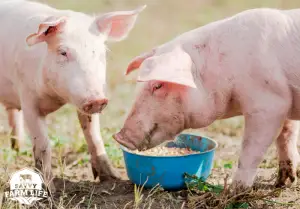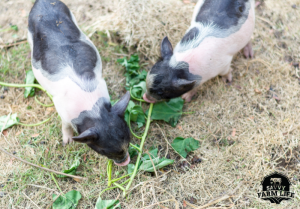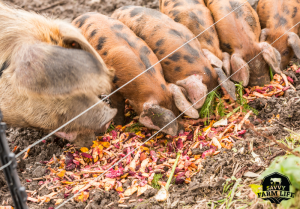What Pigs Can And Can’t Eat
While pigs have a reputation for eating anything and everything, the truth is that they are susceptible to falling ill if fed the wrong foods, just as is the case for humans and other animals. Knowing what you can and cannot feed your pigs is vital to their health and wellbeing.
So, what can pigs eat? Aside from a commercial pig feed, pigs can eat cooked meats, animal byproducts, dairy products, grains, and a variety of fruits and vegetables. Pigs cannot, however, eat raw meat or raw eggs, high-sodium junk food, rotten or rancid food, or specific fruits and vegetables that prove toxic to swine.
Read on to learn more about the specific foods pigs should and shouldn’t eat.
Foods That Pigs Can Eat
Pigs enjoy a varied diet and are able to eat all kinds of food, with diets that can be supplemented with fruits, vegetables, animal products, and grains. Before we talk about what foods to avoid, let’s talk about some of the safe foods that you can feed your pigs.
Pig Feed Mix 
Most pig farmers feed their pigs rations, or commercially-mixed pig feed, as this is the most economical and efficient way to attain the fastest growth potential for their pigs. Commercial pig feed has everything in it that a pig needs for proper growth and development according to their stage in life, and is a mixture of protein (most commonly in the form of soybean or canola) and carbohydrates (most commonly in the form of corn or wheat). Many pig farmers supplement their pig’s feed with various other food items, and some pig farmers avoid the commercial feed mix altogether.
If you are raising pork for profit, it is important that you check the regulations for your location. Some countries and locales do not allow commercial hogs to eat anything other than approved pig rations. Others have restrictions. Within the US, for example, there are 23 states that prohibit what is called “garbage feeding” to swine, while the other 27 states permit this type of feeding so long as one is licensed and cooks the garbage to remove pathogens (yes, you read that correctly – it is advised that food scraps and waste are “cooked” prior to feeding).
Pigs Can Eat Meat
Pigs are omnivores, and can eat a variety of meats – yes, even pork. For a number of reasons (listed below), one should always cook the meat properly before offering it to pigs. Pigs are susceptible to many of the same pathogens as humans, and the pathogens that do not seem to affect pigs can be passed on to humans after ingesting infected pork.
A large portion of a feral pig’s diet consists of animal products. Pigs root in the ground for their food and will ingest anything edible that they find within the soil. This includes vegetation such as mushrooms and tubers, and also animal products like grubs, caterpillars, and worms. A pig’s anatomy is remarkably similar to that of a human’s, and pigs can digest both animal and plant products.
Pigs Can Eat Dairy Products
Though it should not be the main source of nutrition in a pig’s diet, pigs can absolutely eat dairy products (and they love them). In fact, many pig farmers feed the excess milk and whey from neighboring goats, sheep, and cows to their pigs as an additional protein boost.
Pigs Can Eat Eggs
So long as they are not raw, eggs are an excellent and safe source of protein for pigs. An easy way to provide eggs to your pigs is to hard boil them in batches. Once cooked, feed the cooled eggs as they are to your pigs, egg shells and all.
Pigs Can Eat Bread
Though it does not offer a lot of nutrition, pigs can absolutely eat bread, cereal, and other grain products. In fact, many pig farmers collect day-old bread from local bakeries as an economical supplement to their pigs’ diet.
Pigs Can Eat MOST Fruits And Vegetables 
For purposes of understanding what you can safely feed your pigs, it is easier to list the fruits and vegetables you cannot feed your pigs (which we’ve done in the next section). Pigs do enjoy eating fruits and vegetables though, and can eat most of these safely. Safe treats for your pigs include:
- Apples
- Apricots (pitted)
- Bananas
- Beets
- Blackberries
- Blueberries
- Carrots
- Corn
- Cucumbers
- Grapes
- Green Beans
- Kale
- Lettuce
- Melons
- Okra
- Peaches (pitted)
- Peas
- Pears
- Plums (pitted)
- Pumpkin
- Raspberries
- Spinach
- Strawberries
- Yams
- Zucchini
What Pigs Can’t Eat
There is a belief that all of our scraps, food trash, and leftovers can be safely fed to our pigs. This is an incorrect assumption – there are many food products and garden leftovers that will need to go into the bin (compost or trash) and not in your pig’s trough.
Pigs Should Not Eat Raw Meat
Many pig farmers feed their pigs raw meat, but this is not advised for two reasons. The first reason is related to harmful pathogens. Pigs can be infected with trichinosis when eating raw or undercooked meat. Trichinosis is a tiny worm that can then be passed to humans eating undercooked pork. While trichinosis is seen much less frequently now than it was decades ago, it can cause gastrointestinal distress along with other serious complications like high fever, facial swelling, and muscle pain.
The other reason that pigs should not be fed raw meat is because they will develop a taste for it. Pigs that are housed with or near other small animals like chickens, ducks, and rabbits will become a danger once they develop a taste for raw meat. And while this may sound like the premise of a horror movie, there have even been isolated cases of domestic pigs attacking and consuming humans. Allowing pigs to develop a taste for raw meat can cause serious management challenges.
Pigs Should Not Eat Raw Eggs
A few raw eggs from a trusted source will probably not cause a problem if offered to your pigs now and then. If you feed raw eggs to your pigs on a more regular basis though, they may suffer from biotin deficiency. Raw eggs contain avidin, which impacts the absorption of biotin. When the eggs are cooked, the avidin is removed.
Pigs Should Not Eat Brassicas
Like many “forbidden” foods in this list, brassicas are okay if given occasionally. But when fed in large amounts, brassicas can lead to serious systemic complications. Studies suggest that eating these vegetables on a regular basis can cause delayed growth, photosensitivity, enlarged livers, and goiters. Rapeseed in particular may adversely impact the thyroid function and milk quality of sows. And broccoli, when fed raw, has been shown to damage colon cells. All of this said, it is recommended that pigs stay away from brassicas.
Brassicas include broccoli, cauliflower, rapeseed, cabbage, turnips, radishes, brussel sprouts, and mustard greens. In many cases, the stems, leaves, stalks, and seeds will also produce the same (negative) effect as the vegetables themselves.
Pigs Should Not Eat Nightshade Vegetables
Some nightshade vegetables can have adverse health effects in pigs, and should be avoided. Nightshade vegetables contain solanine, which can cause problems with both the central nervous system and digestive system. Green potatoes in particular have been linked to paralysis and death in pigs given sprouting potatoes.
Nightshade vegetables include potatoes, tomatoes, eggplant, peppers, and all of the parts of these plants. Note that cooked tomatoes can be safely fed to pigs – it is only raw tomatoes and tomato products that should be avoided.
Pigs Should Not Eat Celery, Parsnips, Or Parsley
Celery, parsnips, and parsley all contain furocoumarins. Furocoumarins cause photosensitization which can lead to a higher susceptibility to sunburn. This is especially problematic for white (pink) pigs and pigs with patches of white on them.
Pigs Should Not Eat Cherries
The cherry fruit itself is fine for a pig to eat, but it is important to avoid feeding pigs cherry pits, leaves, or any other part of the cherry tree. Do not plant cherry trees in an area that your pigs can access. This can lead to cyanide poisoning which can be fatal.
Pigs Should Not Eat Raw Beans
Raw beans contain a toxin called phytohemagglutinin. This toxin has several adverse effects on the digestive system, and can cause damage to the small intestinal walls. Symptoms of phytohemagglutinin poisoning include diarrhea, loss of appetite, liver enlargement, impaired growth, and death.
Pigs Should Not Eat Junk Food
Humans should not eat junk food, and neither should pigs. Really, no one should eat junk food. At best, heavily processed, salty, and sweet foods provide no real nutritional value. At worst, they can be toxic.
Chocolate should not be fed to pigs because of its theobromine. Theobromine, in high amounts, can negatively affect growth, can cause diarrhea, and can cause lethargy. It has even been known to be fatal. The darker the chocolate, the higher the levels of theobromine.
Every animal needs salt, but too much salt can cause significant health problems for pigs. Salt poisoning can occur when a pig is dehydrated or has had access to especially salty foods. Symptoms of salt poisoning may include digestive upset, muscle spasms, seizures, and even blindness. If you have salt blocks near your pigs, make sure to pick them up and cover them before heavy rainfall. Otherwise the puddles left by the rain can become a deadly salt brine for your pigs.
Pigs Should Not Eat Rotten, Moldy, Or Rancid Food
This should go without saying, but because pigs are assumed to have “stomachs of steel”, this may lead some to believe that they can eat rotten food. This isn’t the case – pigs can become sick from rotten, moldy, or rancid food just as easily as humans and other animals. In fact, pigs are particularly susceptible to mycotoxin poisoning from mold – the most common form of poisoning in pigs. Many pig farmers feed their pigs stale bread products and expired dairy products, which is generally harmless. Rotten and moldy food, on the other hand, will contain pathogens that will be harmful when ingested.
Plants That Pigs Should Not Eat 
In addition to the above, there are specific plants that are known to be toxic to pigs. Pigs should not be allowed to eat the following plants:
- Angel Trumpet
- Bracken
- Camellia
- Cocklebur
- Deadly Nightshade
- Elder
- Flax
- Foxglove
- Hemlock
- Henbane
- Ivy
- Jimsonweed
- Laburnum
- Lantana
- Ragwort
- Rhododendron
Plants that may make your pigs sick, though probably will not fatally poison them, include:
- Aloe Vera
- Birches
- Chinaberry
- Daffodil
- Daisies
- Daphne
- Easter Lily
- Elderberry
- Eucalyptus
- Holly
- Hyacinth
- Hydrangea
- Lobelia
- Narcissus
- Redwoods
- Ranunculus
- Sweet Pea
- Sweet William
- Tulip
Can Pigs Eat Acorns?
You may have read that acorns are a main staple of the pig diet in the wild and when allowed to forage. You may have also read that acorns are toxic to pigs. So which is it – can pigs eat acorns, or should they be avoided?
You may find some articles online that state that acorns may lead to abortion in pregnant sows. While this is the case for some species, especially cattle, there does not seem to be sufficient evidence that this occurs in pigs. Acorns are a large part of the feral pig diet, including in pregnant sows, so it would stand to reason that a food that is a significant percentage of a wild animal’s diet should not cause harm to the offspring of that animal. Then again, we cannot say that with certainty, and you may decide it is safest to avoid feeding acorns to your breeding sows.
While there is not a lot of evidence suggesting acorns are toxic to pigs, there is overwhelming anecdotal evidence of farmers feeding their pigs an acorn-rich diet with no ill effects. In fact, “acorn-finished” hogs are in high demand and are known to produce a rich meat that has a flavorful “earthy” taste. One breed in particular – the Iberian hog – is argued to be the highest quality of ham in the world. Iberian hogs are famously finished on acorns alone for months before they are slaughtered.
When In Doubt About What To Feed Your Pigs, Err On The Side Of Safety
If you’re not sure whether a food is safe for your pigs, it is always best to err on the side of safety. Until you are able to confirm that a food will be harmless, avoid feeding it to your pigs. While pigs are able to live on a much more diverse diet than other livestock, they are not immune to all toxins or pathogens and will need to be fed an appropriate diet.

